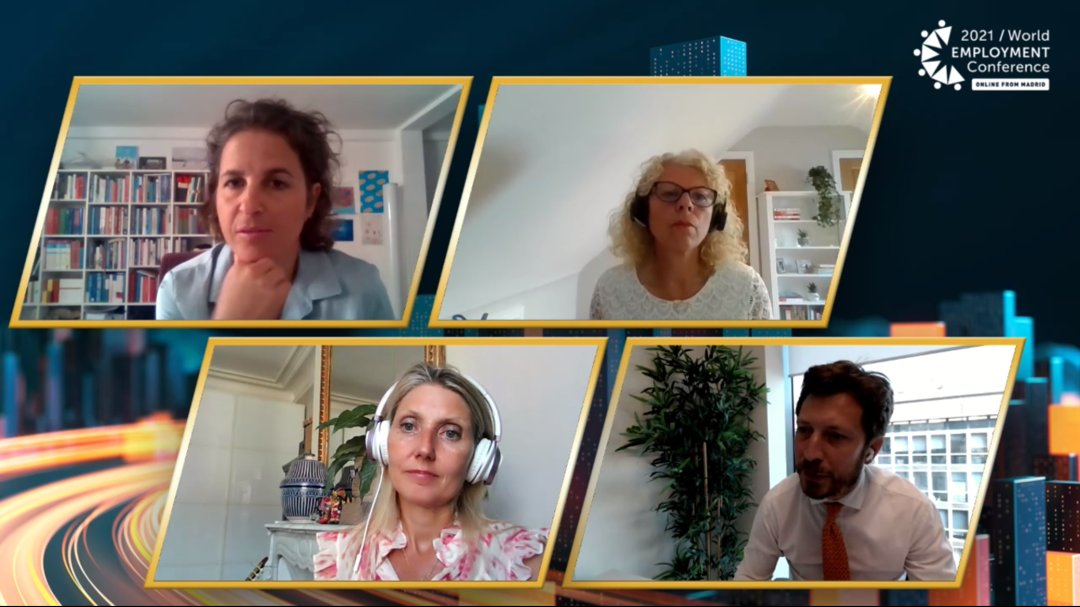Published on 17th September 2021
The recent International Labour Conference in June 2021 recognized career guidance as a pivotal element in skilling and employability. The OECD Employment Outlook 2021 recommends it as a lever for economic recovery and other recent impact studies show that career coaching can make investments in skilling more effective.
Yet, few people have experienced first-hand the value of career coaching. The World Employment Conference 2021 tried to bring that experience during one of its sessions, on 8 September 2021. The session started with a practical exercise aimed at raising awareness around the benefits for individuals. As Sarah Hernon, a Principal Consultant at Right Management working with individuals and employers in enabling careers, said, “working with a career coach is useful not only when you have a pressing need, but also as a way to future-proof your work-life journey and career satisfaction”. Sarah took a practical step to encourage participants to start thinking about what’s next, at a time when they are thriving in their careers, rather than when it is too late and they have to actually take that next step. The exercise proved that a career coach provides the positive challenge you will not get from your best friend and that they can provide the necessary orientation in disrupted and fast changing markets.
Glenda Quentini, a Senior Economist at the OECD and Cristiano Pechy, the President of the AISO, the Italian Outplacement Federation then went on to discuss the collective impact of career coaching and how to embed it more systematically in our approach to work.
As Glenda Quinti pointed out, it all starts with building awareness by providing more information about the service. Her recent work at the OECD showed that 60% of adults have not used career guidance services in the past 5 years. They often do not identify it as key for their success and its tangible impact is difficult to quantify.
In the aftermath of the Covid-19 pandemic and its impact on labour markets, the need to accompany transitions is even clearer. Glenda Quintini explained that career coaching can act as a lever for recovery by helping workers to select from the different options available to them – focusing on the best possible choice for the long-term and not just a short-term fix. Cristiano Pechy then stressed that in these times of rapid and deep changes, workers need orientation and a agile mindset – a skill that raises with career coaching.
So, how to make the use of career guidance more widespread? In Italy, Cristiano Pechy explained, AISO has placed request to the Italian government to make outplacement – which includes career coaching – mandatory for any worker losing their job. With 1 million employees having lost their job during the pandemic, Italy faces a large unemployment challenge and outplacement has proven that it can fasten the redeployment of those workers.
Only four countries currently have mandatory outplacement in their legislation and they report similar outcomes. In one of them, Belgium, the national federation Federgon reports fastened transitions and through that, direct savings of unemployment benefits for the state, more targeted moves for individuals and more. Building on this strong track record, Federgon is now working on including career coaching in “Transition Trajectories” – an initiative to create bridges between jobs, from employer to employer. This approach lives on the idea that a job transition should be anticipated, and that avoidance of unemployment is critical – for the public and for the individual themselves.
All agreed that, while career coaching is recognized for making labour markets more efficient and enabling workers to become job-ready, employers have their share of responsibility. As careers become less linear, and work transitions more frequent, employers might not feel the need to invest in the workers leaving. But by supporting their exiting employees, they can also contribute to more resilient talent market. And career coaching is beneficial within and beyond a specific employment contract.
Summing up the discussion, it appears that career coaching has an impact on employability, not only in context of an individual event in one’s professional life (e.g. a job loss), but also for the economic recovery and for resilient labour markets. By making workers more agile and better connected to the needs of the world of work, labour markets become smoother and businesses find the suitable & ready talents quicker.
Ultimately all stakeholders bear their part of responsibility on fostering employability. Of course, the individual does, but surely as well the employers. The latter – as they rely on ready-made talents from the markets – have the responsibility to support those leaving talents. And ultimately the public entities play a significant role too, by setting the right incentives to encourage the use of the service.
WEC’s Career Management Network, bringing together the major players in the career management industry and national federations, has some recommendations to ensure that all stakeholders take part in future-proofing employability:
